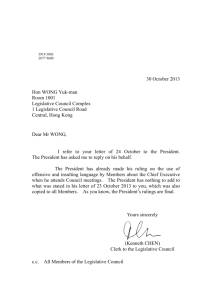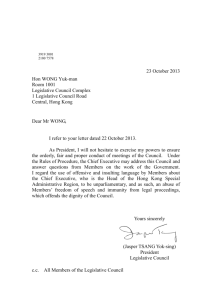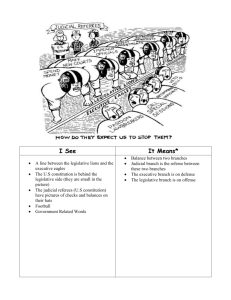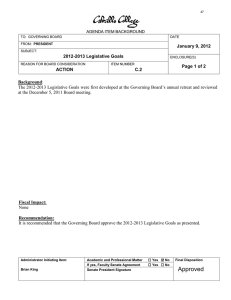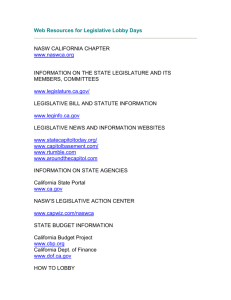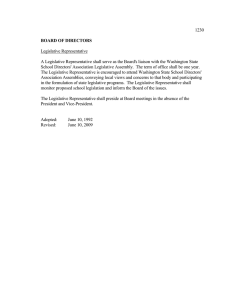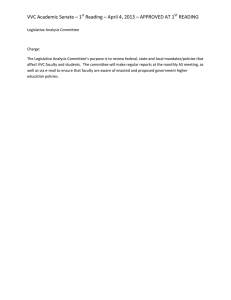Proposed Marin Community College District Policy CCLC No. 2320 Board of Trustees
advertisement
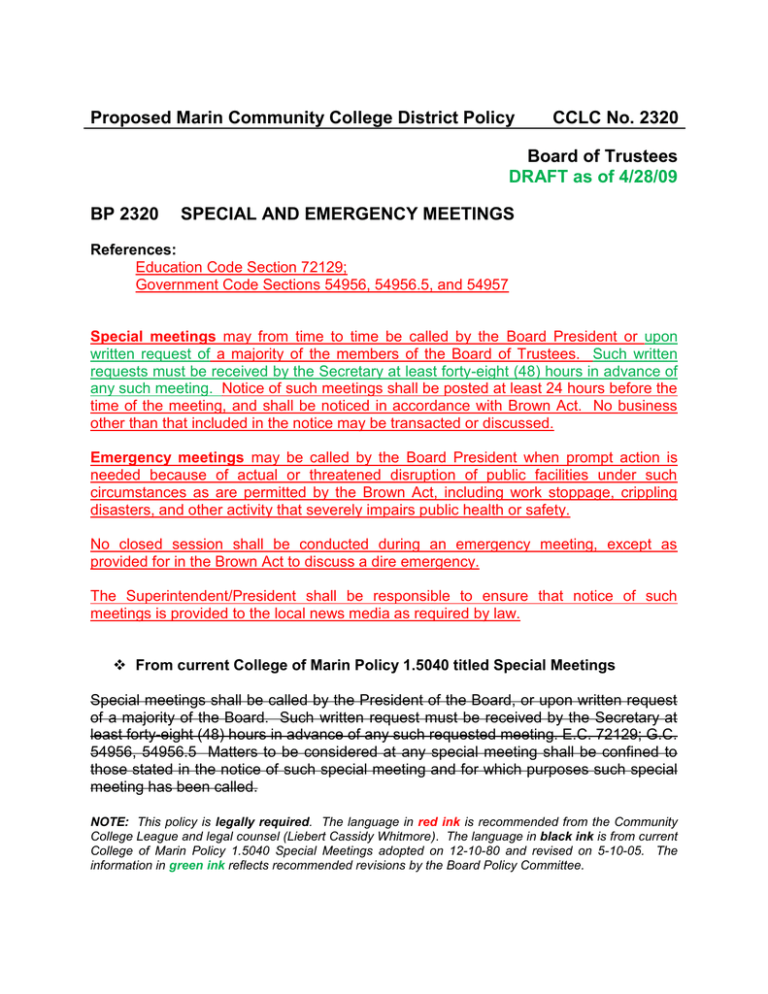
Proposed Marin Community College District Policy CCLC No. 2320 Board of Trustees DRAFT as of 4/28/09 BP 2320 SPECIAL AND EMERGENCY MEETINGS References: Education Code Section 72129; Government Code Sections 54956, 54956.5, and 54957 Special meetings may from time to time be called by the Board President or upon written request of a majority of the members of the Board of Trustees. Such written requests must be received by the Secretary at least forty-eight (48) hours in advance of any such meeting. Notice of such meetings shall be posted at least 24 hours before the time of the meeting, and shall be noticed in accordance with Brown Act. No business other than that included in the notice may be transacted or discussed. Emergency meetings may be called by the Board President when prompt action is needed because of actual or threatened disruption of public facilities under such circumstances as are permitted by the Brown Act, including work stoppage, crippling disasters, and other activity that severely impairs public health or safety. No closed session shall be conducted during an emergency meeting, except as provided for in the Brown Act to discuss a dire emergency. The Superintendent/President shall be responsible to ensure that notice of such meetings is provided to the local news media as required by law. From current College of Marin Policy 1.5040 titled Special Meetings Special meetings shall be called by the President of the Board, or upon written request of a majority of the Board. Such written request must be received by the Secretary at least forty-eight (48) hours in advance of any such requested meeting. E.C. 72129; G.C. 54956, 54956.5 Matters to be considered at any special meeting shall be confined to those stated in the notice of such special meeting and for which purposes such special meeting has been called. NOTE: This policy is legally required. The language in red ink is recommended from the Community College League and legal counsel (Liebert Cassidy Whitmore). The language in black ink is from current College of Marin Policy 1.5040 Special Meetings adopted on 12-10-80 and revised on 5-10-05. The information in green ink reflects recommended revisions by the Board Policy Committee. Date Adopted: (Replaces current College of Marin Policy 1.5040) Legal Citations for BP 2320 CALIFORNIA CODES EDUCATION CODE SECTION 72129 72129. (a) Special meetings may be held at the call of the president of the board or upon a call issued in writing and signed by a majority of the members of the board. (b) A notice of the meeting shall be posted at least 24 hours prior to the special meeting and shall specify the time and location of the meeting and the business to be transacted and shall be posted in a location that is freely accessible to members of the public and district employees. CALIFORNIA CODES GOVERNMENT CODE SECTIONS 54956, 54956.5, and 54957 54956. A special meeting may be called at any time by the presiding officer of the legislative body of a local agency, or by a majority of the members of the legislative body, by delivering written notice to each member of the legislative body and to each local newspaper of general circulation and radio or television station requesting notice in writing. The notice shall be delivered personally or by any other means and shall be received at least 24 hours before the time of the meeting as specified in the notice. The call and notice shall specify the time and place of the special meeting and the business to be transacted or discussed. No other business shall be considered at these meetings by the legislative body. The written notice may be dispensed with as to any member who at or prior to the time the meeting convenes files with the clerk or secretary of the legislative body a written waiver of notice. The waiver may be given by telegram. The written notice may also be dispensed with as to any member who is actually present at the meeting at the time it convenes. The call and notice shall be posted at least 24 hours prior to the special meeting in a location that is freely accessible to members of the public. 54956.5. (a) For purposes of this section, "emergency situation" means both of the following: (1) An emergency, which shall be defined as a work stoppage, crippling activity, or other activity that severely impairs public health, safety, or both, as determined by a majority of the members of the legislative body. (2) A dire emergency, which shall be defined as a crippling disaster, mass destruction, terrorist act, or threatened terrorist activity that poses peril so immediate and significant that requiring a legislative body to provide one-hour notice before holding an emergency meeting under this section may endanger the public health, safety, or both, as determined by a majority of the members of the legislative body. (b) (1) Subject to paragraph (2), in the case of an emergency situation involving matters upon which prompt action is necessary due to the disruption or threatened disruption of public facilities, a legislative body may hold an emergency meeting without complying with either the 24-hour notice requirement or the 24-hour posting requirement of Section 54956 or both of the notice and posting requirements. (2) Each local newspaper of general circulation and radio or television station that has requested notice of special meetings pursuant to Section 54956 shall be notified by the presiding officer of the legislative body, or designee thereof, one hour prior to the emergency meeting, or, in the case of a dire emergency, at or near the time that the presiding officer or designee notifies the members of the legislative body of the emergency meeting. This notice shall be given by telephone and all telephone numbers provided in the most recent request of a newspaper or station for notification of special meetings shall be exhausted. In the event that telephone services are not functioning, the notice requirements of this section shall be deemed waived, and the legislative body, or designee of the legislative body, shall notify those newspapers, radio stations, or television stations of the fact of the holding of the emergency meeting, the purpose of the meeting, and any action taken at the meeting as soon after the meeting as possible. (c) During a meeting held pursuant to this section, the legislative body may meet in closed session pursuant to Section 54957 if agreed to by a two-thirds vote of the members of the legislative body present, or, if less than two-thirds of the members are present, by a unanimous vote of the members present. (d) All special meeting requirements, as prescribed in Section 54956 shall be applicable to a meeting called pursuant to this section, with the exception of the 24-hour notice requirement. (e) The minutes of a meeting called pursuant to this section, a list of persons who the presiding officer of the legislative body, or designee of the legislative body, notified or attempted to notify, a copy of the roll call vote, and any actions taken at the meeting shall be posted for a minimum of 10 days in a public place as soon after the meeting as possible. 54957. (a) Nothing contained in this chapter shall be construed to prevent the legislative body of a local agency from holding closed sessions with the Attorney General, district attorney, agency counsel, sheriff, or chief of police, or their respective deputies, or a security consultant or a security operations manager, on matters posing a threat to the security of public buildings, a threat to the security of essential public services, including water, drinking water, wastewater treatment, natural gas service, and electric service, or a threat to the public's right of access to public services or public facilities. (b) (1) Subject to paragraph (2), nothing contained in this chapter shall be construed to prevent the legislative body of a local agency from holding closed sessions during a regular or special meeting to consider the appointment, employment, evaluation of performance, discipline, or dismissal of a public employee or to hear complaints or charges brought against the employee by another person or employee unless the employee requests a public session. (2) As a condition to holding a closed session on specific complaints or charges brought against an employee by another person or employee, the employee shall be given written notice of his or her right to have the complaints or charges heard in an open session rather than a closed session, which notice shall be delivered to the employee personally or by mail at least 24 hours before the time for holding the session. If notice is not given, any disciplinary or other action taken by the legislative body against the employee based on the specific complaints or charges in the closed session shall be null and void. (3) The legislative body also may exclude from the public or closed meeting, during the examination of a witness, any or all other witnesses in the matter being investigated by the legislative body. (4) For the purposes of this subdivision, the term "employee" shall include an officer or an independent contractor who functions as an officer or an employee but shall not include any elected official, member of a legislative body or other independent contractors. Nothing in this subdivision shall limit local officials' ability to hold closed session meetings pursuant to Sections 1461, 32106, and 32155 of the Health and Safety Code or Sections 37606 and 37624.3 of the Government Code. Closed sessions held pursuant to this subdivision shall not include discussion or action on proposed compensation except for a reduction of compensation that results from the imposition of discipline.

